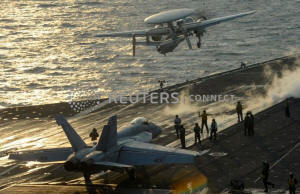Exclusive: Too risky to come home, crew of 'clean' U.S. warship in
coronavirus limbo
 Send a link to a friend
Send a link to a friend
 [May 01, 2020]
By Phil Stewart and Idrees Ali [May 01, 2020]
By Phil Stewart and Idrees Ali
WASHINGTON (Reuters) - On any given day,
the U.S. aircraft carrier Harry S. Truman can be found off the Atlantic
coast of the United States, probably somewhere between Virginia and
Florida. Its crew would love to come home to their families. But they
can't. They're just too valuable right now.
That's because the Truman is a "clean" ship, free from the coronavirus
thanks to a longer-than-expected deployment at sea that started in
November. The deployment has kept its battle-ready 4,500 crew out of
reach of a pandemic that is wreaking havoc elsewhere in the Navy.
Captain Kavon "Hak" Hakimzadeh and members of his crew described to
Reuters in exclusive interviews the mixed emotions of being so close to
home, but too precious to pull into port, as the Truman settles into a
pandemic-driven operational limbo.
"This is a really weird situation for us," Hakimzadeh told Reuters by
phone, the only way to speak to anyone on board given a ban on visitors.
The crew members interviewed said they understood why the Truman needed
to remain offshore to ensure combat readiness. The virus ripped through
another carrier, the Theodore Roosevelt, infecting more than 1,100
sailors.

The hope is that once the Nimitz aircraft carrier strike group is up and
running, the Truman can finally come home. But with the coronavirus
proving dangerous and the world being unpredictable, the Navy doesn't
want to put a date on the Truman's return.
Being so close to home is a constant reminder for sailors of the strain
on their families in the United States, where in just months coronavirus-related
deaths have reached at least 62,800, surpassing the number of Americans
killed in the Vietnam War.
For Lieutenant Elise Luers, a 28-year-old helicopter pilot, her mind
wanders to a family friend who died and a brother-in-law who works at a
hospital treating coronavirus patients. She also worries about her
wedding plans in October.
"It's absolutely frustrating. There's absolutely anxiety and stress, not
knowing when we're going home," she told Reuters, adding "it's nothing
we can't handle." She and others say they are proud to serve and have
learned to expect the unexpected.
The U.S. Navy boasts that it draws the kind of people who want to run
toward danger, while keeping their families safe back home. It's the
kind of thinking that has become deeply embedded in the military since
the Sept. 11, 2001 attacks that led to the war in Afghanistan.
But the coronavirus is upending those instincts, since home is where the
danger is most acute.
"The emotional toll of wanting to get home, to be on the front lines
(against the virus) and protect our families is a tough one," Hakimzadeh
said.
THE LAST SHIP?
In a world awash with dark Hollywood dramas, one television show that's
been popular among the Truman crew is "The Last Ship." It imagined a
U.S. Navy destroyer that was at sea, in radio silence, when a deadly
pandemic devastated the world.
Senior Chief Petty Officer Kevin Dublynn said one of his shipmates had
mentioned it to him.
"He felt like, 'Oh, man. This is just like 'The Last Ship' show,'"
Dublynn said. "I was like, 'No, it's not,'" adding the Navy had plenty
of ships.
Steven Kane, the TV show's co-creator and executive producer, said the
2014-2018 TNT drama explored how ill-intentioned people could exploit a
pandemic and how easily a virus could wipe out a ship.
[to top of second column]
|

An F/A-18E Super Hornet lines up on a catapult on the flight deck
while an E-2D Hawkeye takes off from the the U.S. Navy aircraft
carrier USS Harry S. Truman in the Arabian Sea January 11, 2020.
U.S. Navy/Mass Communication Specialist Seaman Apprentice Isaac
Esposito/Handout via REUTERS

Kane acknowledged that readiness was crucial "but my heart breaks
for the families and the sailors who are stuck now just off the
coast."
The Pentagon has been trying to warn adversaries that ships such as
the Truman are by no means the exception and the U.S. military
remains ready for war despite the pandemic. "The U.S. Navy has 90
ships at sea on watch for the American people," U.S. Defense
Secretary Mark Esper said on Twitter April 17.
In some ways, the Truman is perhaps one of the world's biggest
quarantine bubbles. Beyond an increased pace of disinfections on
board, the ship's day-to-day activities are much the same as before
the pandemic - no testing, no six-feet of space between sailors,
according to crew members.
Every entry onto the ship carries risk, so the Truman has stopped
everything but essential resupply flights, and under tight controls.
"The biggest threat is always going to be from people coming on
board," said Commander Veronica Bigornia, the Truman's senior
medical officer.
Once the Truman does come home, its crew risk infection and cannot
be presumed to be clear of the virus, requiring lots of testing and
quarantines.
U.S. officials told Reuters that more than two dozen warships have
counted coronavirus infections among their crews while at port.
ROLE REVERSAL
After 22 years in the Navy, Dublynn from Brooklyn, New York, is used
to being the family hero. But now, he says his attention is on his
brother, who is a nurse at Coney Island Hospital.
"Right now, he's my hero," said Dublynn, the carrier's air traffic
control watch center supervisor.
While at sea, some crew have lost family to the virus while others
have seen their personal lives at home upended.
The Truman's deployment itself has already been full of surprises.

Its departure was delayed until November because of electrical
troubles. Then it steamed to the Middle East as tensions with Iran
soared.
"Every time it looked like it was time to kind of head back home,
tensions flared up a little bit," Captain Hakimzadeh said.
Petty Officer Second Class Justin Dallarosa, 34, recalled the roller
coaster of emotions breaking the news to his wife on April 13 that
they would be coming home later than expected. He has two daughters,
both under three. The youngest will turn one in May.
Still, like other members of the crew, he takes comfort in knowing
his family is provided for during economic uncertainty.
"I've got some friends back home who lost their jobs with COVID," he
said. "My family is taken care of."
(Reporting by Phil Stewart and Idrees Ali; Editing by Mary Milliken
and Grant McCool)
[© 2020 Thomson Reuters. All rights
reserved.] Copyright 2020 Reuters. All rights reserved. This material may not be published,
broadcast, rewritten or redistributed.
Thompson Reuters is solely responsible for this content. |